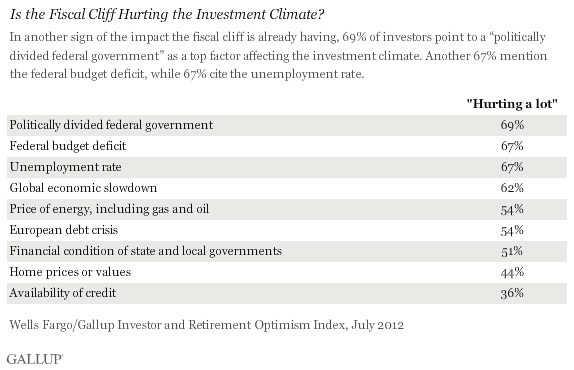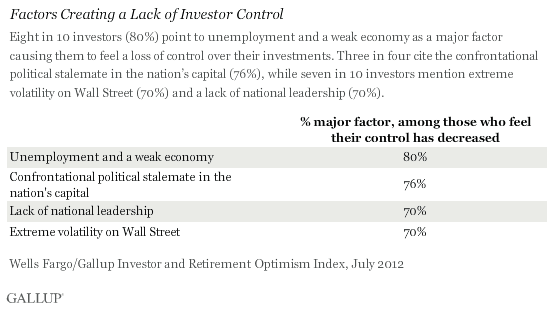Executives must prepare for the very real possibility that U.S. leaders might take the economy over the so-called fiscal cliff. In terms of impact on the economy, think federal debt ceiling crisis multiplied by 10.
Executives may want to develop contingency plans in case perceptions of this danger intensify.
In the 1950s, teenagers played a game called "chicken." In one version of the game, two drivers would race their cars toward the edge of a cliff until one braked first, losing the game. In the extreme, emotions dominated, and both players simply went over the cliff.
One political version of this game played out during last year's confrontation over the U.S. budget ceiling. This political standoff sent economic confidence plunging, lowered the U.S. debt rating, slowed the U.S. economy, and threatened to take the country into another recession -- or something worse.
Right now, politicians are playing another version of "chicken" over the so-called fiscal cliff -- the automatic elimination of the Bush-era and other tax cuts and the automatic decrease in defense and other spending that are scheduled to take effect in 2013. The most recent Wells Fargo/Gallup Investor and Retirement Optimism Index poll investigated how investors are feeling about the fiscal cliff and several related issues.
Analysis of the poll results suggests that the U.S. economy is already suffering from fears about the fiscal cliff, and the impact could worsen in 2013. Executives may want to develop contingency plans in case perceptions of this danger intensify as the presidential debates get underway in October or if the political stalemate continues when Congress begins its lame duck session following the presidential election.
The fiscal cliff may send the U.S. economy into recession in 2013
Though both political parties seem to be avoiding addressing the fiscal cliff issue, a majority of investors (54%) say they are paying a "great deal" or "quite a lot" of attention to it. Most discussions of the fiscal cliff tend to focus on the damage it could cause to the U.S. economy if Congress and the president fail to take action.
For example, a recent Congressional Budget Office report notes that if several current tax cuts expire and spending decreases take place as scheduled in 2013, it could lead to a recession. Many economists have projected similar forecasts for next year. Gallup's polling shows that 61% of investors also think the U.S. economy will go into recession next year if nothing is done to address the fiscal cliff.

Businesses find it difficult to plan -- and more importantly, to spend or invest -- when they are uncertain about what consumers or government will be spending and when they don't know what their future tax rates will be. One major reason businesses are reluctant to hire right now is because they have limited "visibility" regarding future revenues. And companies that work on contract with the government have no real insight into potential spending cuts. Businesses also aren't hiring because they don't know how additional employees could affect the taxes they will pay or what their healthcare costs will be in 2013.
As consumers and businesses pull back on spending, investing, and hiring in response to these political and economic uncertainties, it is not surprising that the U.S. unemployment rate remains above 8% -- nor that many employees are worried about keeping their jobs.
In another sign of the immediate impact of the fiscal cliff, another agency downgraded the U.S. government's credit rating on Friday. The administration also released its proposed areas for federal spending cuts, including those for the defense department, on Friday. By law, companies that are affected are supposed to notify employees of any potential related layoffs.

Memories of last year's federal budget ceiling debacle are likely affecting investor concerns, as is the level of confrontation in Washington, D.C. And the potential for a similar showdown over the fiscal cliff could also be affecting investor confidence.
Political confrontation creates a lack of control
Political decision making often differs from economic rational decision making.
About half of investors (48%) say they feel "little control" to "no control at all" in their efforts to build and maintain their retirement savings in the current environment. Thirty-three percent say they have "quite a lot of control," and 19% feel they have "a great deal of control." Twenty-eight percent say their control over building and maintaining their retirement savings has decreased over the past six months, while 15% say it has increased, and 56% say their control has remained the same.
Eight in 10 investors (80%) point to unemployment and a weak economy as a major factor causing them to feel a loss of control over their investments. At the same time, 76% cite the confrontational political stalemate in the nation's capital as a major factor -- another reference to the probable political confrontation over the fiscal cliff. Tied for third are the extreme volatility on Wall Street (70%) and a lack of national leadership (70%).

Investors take the U.S. elections personally
When it comes to fixing the current U.S. economy, 7% of investors cite the president, 11% cite Congress, and 7% point to the private business sector as being solely responsible. Instead, three in four investors (74%) say all three groups are accountable for addressing the country's economic problems.
Though investors do not assign responsibility for the future of the economy to any individual group, they do say the presidential and congressional elections of 2012 will have a direct impact on their finances. About four in 10 (43%) say the outcome of the elections will have a major impact on their net worth, while 33% say it will have a minor impact.
What executives should do
Now that the political conventions are over, executives must recognize that the effects of the "political economy" -- the part of the economy that can be influenced by political discourse in the United States -- could intensify as the November elections approach. The political intensity surrounding the presidential campaigns will only increase, and discussions of the coming fiscal cliff are likely to intensify, as are concerns about its potential to create a recession in 2013. Politicians are unlikely to take action to address this problem before November because they are leaving Washington, D.C., in mid-September to campaign before the elections. And the recent actions by the Federal Reserve can only help on the margins of the economy; they cannot replace government action on the fiscal cliff.
What's more, political confrontation over the fiscal cliff is likely already having an effect on investors and on the U.S. economy. The political economy has real-world consequences. Investors are correct to see political confrontation and presidential elections as major reasons for concern and real potential dangers to their net worth.
For contingency planning purposes -- and assuming that the degree of political confrontation over the fiscal cliff intensifies -- executives may want to look back to July and August 2011 to see what happened to consumer and business confidence and their business during a time of high political confrontation. Executives should also keep in mind that political decision making often differs from economic rational decision making. For example, a politician's political support might increase if he or she refuses to compromise, though the best decision for the economy might be to do so.
It's not clear if or how the fiscal cliff will be resolved if neither political party receives a clear mandate in the coming elections. What is clear is that the nation's economy is heading for a fiscal cliff, and last summer's legislation has put a stone on the gas pedal. Unless Congress acts, the U.S. will go over the cliff.
It will take cooperation on the part of both Congress and the president to stop the economy from toppling over the fiscal cliff. While the financial markets seem to be assuming that the fiscal cliff and related issues will simply be addressed following the elections, business executives would be wise to think about recent experience and plan as though that might not be the case.